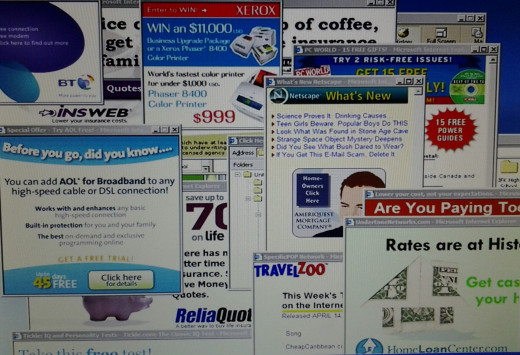AdBlock Pros and Cons

To Block Or Not To Block
Most of my articles are informatory in nature (and this one is no exception), but are usually about issues which irk me to no end. In fact, one of the main reasons I write, is to vent my frustration and hopefully sleep better at night. The Ad Block controversy has been in the news often enough, so that I was forced to delve into the legality of recording and playback devices, and the right for advertisers to advertise. I found it so interesting, that I thought I would share it with the public (or at least my 13 followers). Please be advised, that I neither endorse nor oppose Ad Block Plus. I'll give a brief history of the subject, and I will confine the discussion to video (TV and the internet), since the legality of recording audio (music) has, for the most part, already been decided.
When VTR's (Video Tape Recorders) came out in the 1970s, I thought they were the greatest invention since sliced bread. I taped as many movies as I could because I enjoyed watching the same movies over and over again. I also taped various sporting events when they conflicted with my normal TV watching schedule. The legal ramifications of copying movies didn't concern me. I knew that if I wasn't selling copies of my movies or running a movie theater out of my house, then I probably wasn't doing anything wrong. I also knew that if MGM or Universal Studios ever wanted to sue somebody for the copying of copyrighted material, then they would surely go after the VTR manufacturers and not each consumer.
Well, in the 1984, MGM and Disney sued Sony for "copyright infringement." At the time, I didn't think that they had a case, simply because the VTR's primary function was to record TV broadcasts for which the viewers could not originally watch due to scheduling conflicts. The courts, for the most part, ruled along the same lines as my reasoning. The legal term, "Time-Shifting", was coined, and it basically meant that recording something for viewing at a later date, fell into the "Fair Use" category of the product and, therefore, was not illegal.

Now, I'm going to narrow our focus to advertising. First of all, income derived from advertising accounts for 95% of a company's earnings. When VTR's hit the market, commercial advertisers also thought that they were getting the short end of the stick, because viewers could now fast-forward through recorded commercials. However, since viewers were always free to use the bathroom, pop popcorn, channel-surf, etc., during commercial breaks, the courts ruled that there no evidence to warrant a judgment against VTR manufacturers. An ongoing "tug-a-war" ensued between the courts and advertisers, with the latter introducing new arguments, and the former ruling with counter-arguments. As someone who watches a great deal of TV, I don't consider commercials to be anything more than a minor inconvenience. However, I have friends who are animatedly against commercials because they consider them obtrusive to point of being harassing. And, those of my friends who are parents, are particularly upset because they feel that the sheer abundance of commercials sends a message to children that they are consumers, not just kids trying to watch Bugs Bunny (I apologize for my dated reference).
As technology progressed, cable and satellite services began offering hundreds of new TV channels, and digital video proved to be far superior than analog video (although there is still a small market for analog devices). This created a need for more state-of-the-art playing and recording equipment. By the turn of the 21st Century, DVR's (Digital Video Recorders) hit the market like a tidal wave, in the forms of TiVo and Replay TV.

TiVo offered the TV viewer almost everything imaginable, regarding digital video recording: On-screen guides of all scheduled TV broadcasts, "Season Passes" (which would automatically record entire seasons of preferred TV shows, "Wish Lists" (which would show viewers what they might want to watch, by taking into account their interests such as title, actor, director, category, etc.). And, of course, everything eventually became compatible with desktop computers, i-pads, notebooks, i-phones, smart phones, androids, cyborgs, replicants, etc., for the purpose of making visual stimuli even more convenient.
Replay TV was slightly different than TiVO. Replay TV offered the same conveniences and compatibility as TiVo, but they offered an added feature: When Replay TV recorded TV broadcasts, it would skip over the commercials automatically. In other words, the viewer would not have to endure, ignore or even fast-forward through commercials. This infuriated advertisers because they were paying TV stations to show their commercials, and with Replay TV, the viewers had no knowledge of what was even being advertised. So, the one in a thousand chance, that a commercial might be of some interest to a viewer, was virtually blown out of the water. This was a strong argument, since "time-shifting" was no longer a valid counter-argument.
The advertisers sued SONIC Blue, the parent company of Replay TV, but they made a tactical error in their suit: They demanded damages in the form of profits made from the future sales of Replay TV devices. This strategy backfired because SONIC Blue declared bankruptcy during the lengthy trial. Since then, Replay TV has changed hands a couple of times, and is currently owned by Direct TV. Direct TV confined Replay TV's services to analog equipment which, in my opinion, all but signed Replay TV's death warrant. There's really not much more to say, regarding TV commercials, until another Replay TV-like company emerges and offers digital service.
Now, the progression of technology also meant that fewer people were watching TV in general, since there was nothing on television that couldn't be found on the internet. Cable and satellite companies were being squeezed, so they allowed advertisers to inject commercials into their unedited movies, much to the chagrin of the viewer. But, advertisers had already set their sights on the internet, and began to saturate the web with ads, purely for self-preservation. But there is a dramatic difference between TV commercials and internet pop-up ads: During commercials breaks, viewers are free to do whatever they wish (as listed above), but with internet pop-up ads, the viewer is virtually forced to look at the ads, if only for a split second, before they can "click" them off of the screen. And, unless the viewers peripheral vision is severely impaired, they will most likely see hundreds of side-screen ads while they surf the web.

I understand that a large portion of our economy is driven by advertisers, so advertisements are important. But, I'm also cognizant of a person's right not to be bombarded by constant advertising. A program like Ad Block Plus, gives consumers a measure of control over what they want to see (or rather what they don't want to see), but it also blockades an important avenue for which advertisers can show their ads.
I'm old-school; cell phones, the internet, and computers in general, are still mind-boggling to me, so having to put up with advertisements, is a small price to pay for the convenience that technology affords me. So, I think that the staunch, anti-ad advocates, must examine the engine that makes the internet run. Years ago, after I bought my first computer, I paid a monthly fee of $18.99 for internet access. Maybe I was naïve, but I thought that my $18.99 per month, was funding every website for which I chose to enter. When internet services like AOL started offering free internet access, it made me re-think the situation. I learned that my $18.99 was going to my internet provider, and that the websites were being funded by advertisers who were paying for ad space on the sites.
So, here's my question for the anti-ad people: Would you rather cope with internet ads, or experience ad-free browsing at a cost of 25 cents per viewed website? Somebody has to fund those sites. Will it be advertisers or web-surfers? It's a zero-sum game. If everyone were to use programs like Ad Block, then it's a distinct possibility that, one day, when they log-on to the internet, there will be no websites to browse. Sure, most ads are annoying, but we've been putting up with TV commercials, flyers, billboards ads, sky-writing ads, etc. for the last 70 years. I am in the camp for just biting the bullet on internet ads.
As for parents who are trying to protect their children from questionable advertising content, and the potential harm that numerous ads pose to kids, regarding consumerism: unfortunately, you will have to more closely monitor how much TV your children watch and/or how much time they spend on their computers, cell phones, etc.. New technology always spurs new hazards. That's the way of the world.
Only time will tell how this all plays out, but I'm not worried. There are brighter minds than mine involved, and I'm confident that they're all looking at the big picture, as should everyone.
© 2014 Daniel Marcosi








